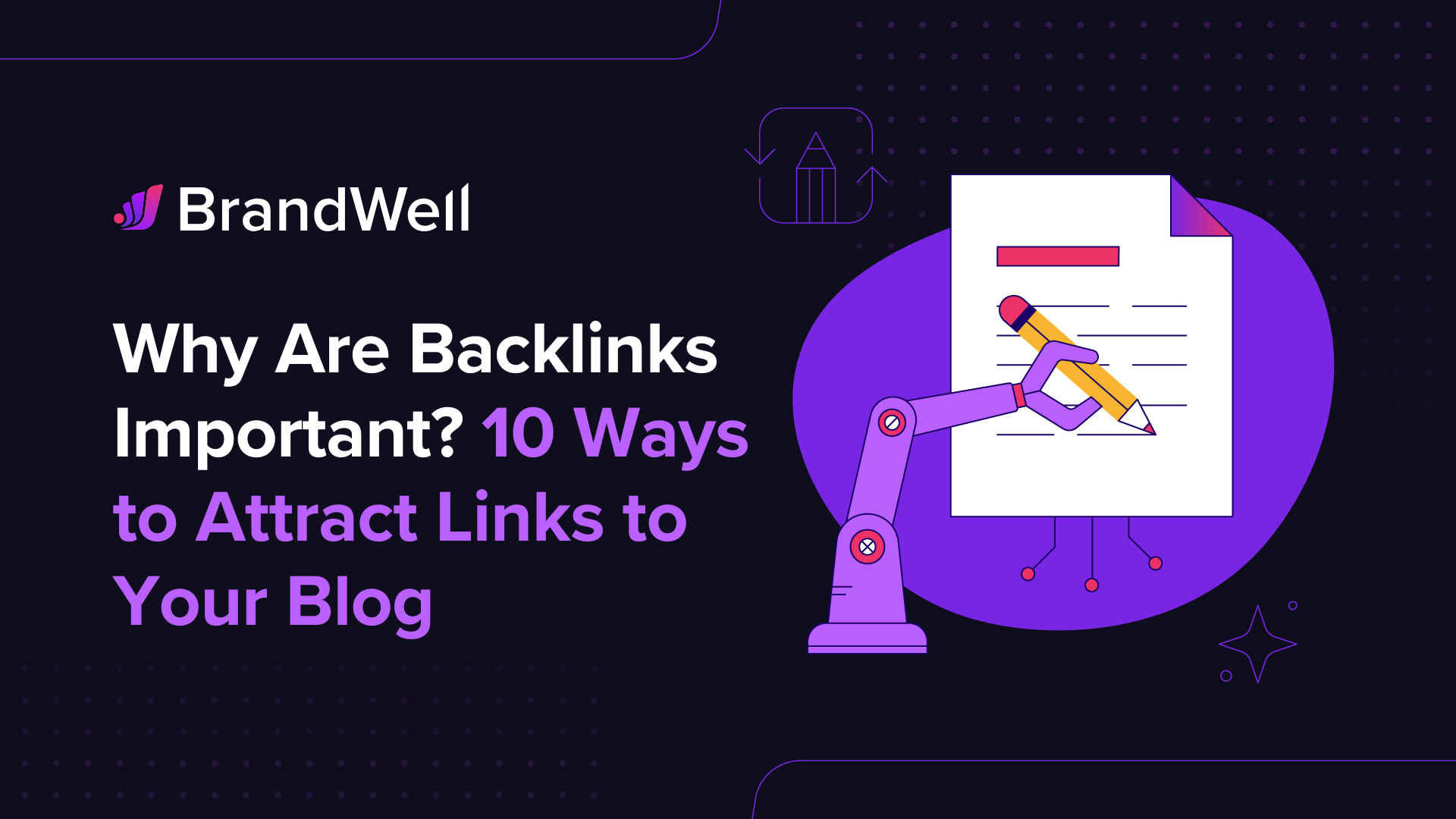Backlinks are still considered very important for SEO in 2025 as they act as a key signal to search engines about a website’s authority and quality.
Unfortunately, 94% of websites don’t have backlinks, and only 2.2% of content generates links from multiple websites.
So how do you get backlinks to elevate your blog’s visibility and credibility?
In this blog post, we will explore the importance of backlinks for your blog growth and share various strategies on how to generate these high-quality inbound links.
What are Backlinks?
Backlinks are like “votes of confidence” from one website to another. If a website links to your blog, it’s like saying, “Hey, this page has good stuff!”
Search engines like Google notice these links and use them to decide which websites should appear higher in search results.
There are two types of backlinks:
- DoFollow – These backlinks pass SEO value (link juice) and help improve rankings.
- NoFollow – These backlinks do not pass SEO value directly but can still drive traffic and brand exposure.
But where do these links come from?
📝 High-Authority Websites: Editorial links are natural backlinks earned when a high-authority site mentions and links to your content. These are some of the most powerful and desirable backlinks.
✍️ Guest Posts: These backlinks come from guest blogging — writing content for another website and including a link back to your blog. If done on high-quality sites, guest post backlinks can significantly boost your authority.
🏅 Badges: A badge backlink is when you create a custom badge or certification (such as “Top 10 Best Blogs in 2025”), and other websites display it on their site with a backlink to yours. This strategy is effective for building brand awareness and generating natural links.
💬 Comments and Forums: These backlinks come from engaging in blog comments and forums where you leave a link back to your website. While most are NoFollow, they can still drive targeted traffic and help with networking.
🎥 Webinars: If you host a webinar and share valuable insights, people may link to the webinar page or transcript as a reference, helping you earn backlinks from relevant sources.
🛠️ Free Tools: Creating free tools, calculators, or resources encourages other websites to link to your tool as a helpful reference. This is an excellent way to attract high-quality backlinks naturally.
🏢 Business Profiles: Creating profiles on business directories, social media platforms, and review sites often allows you to add a link back to your website. Examples include Google My Business, Yelp, LinkedIn, and Crunchbase.
📰 Press Releases: Publishing a press release about a new product, service, or major update can generate backlinks from news websites and industry publications. These links can help boost credibility and visibility.
📝 User-Generated Content: UGC backlinks come from content created by users, such as comments, forum posts, and community-driven content. While these links often carry a rel=”ugc” tag, they can still help drive engagement and traffic.
The more high-quality backlinks you have from trusted websites, the more likely your site is to rank well on Google.
What are these trusted websites? These are sites that tend to have high domain authority and trustworthiness ratings.
Examples include:
- News websites: BBC, CNN, The New York Times, Forbes
- Educational & government sites: Harvard University, MIT, NASA, CDC
- Tech giants & social media: Google, Wikipedia, YouTube, Facebook, LinkedIn
- E-commerce & marketplace sites: Amazon, eBay, Etsy
- SEO & marketing industry leaders: Moz, Search Engine Journal, The Content Marketing Institute
A backlink from any of these entities can surely boost your site’s credibility and rankings.
Why Are Backlinks Important for Your Blog?
Backlinks help your blog grow by improving its visibility, credibility, user experience, and ranking on search engines like Google.
Here’s why they matter:
1. Higher Search Engine Rankings
Search engines like Google use backlinks as a ranking signal. When a high-quality website links to your blog, it tells search engines that your content is valuable, trustworthy, and relevant. As a result, your blog is more likely to appear at the top of search results for relevant keywords.
However, not all backlinks are created equal. Quality matters more than quantity — a few links from authoritative, well-respected websites are far more valuable than dozens of links from low-quality or spammy sites.
By consistently earning high-quality, relevant backlinks, you can improve your domain authority, making it easier for your blog posts to rank for competitive keywords.
2. Increased Website Authority & Trust
In addition to enhancing search engine rankings, backlinks also contribute to the overall authority and influence of your blog.
When reputable websites link to your content, it signals to search engines that your site is trustworthy and valuable. As your blog accumulates quality backlinks from reputable sources, it establishes itself as an authoritative voice in your field.
This growing authority can attract even more high-quality links and collaborations, creating a positive feedback loop that further strengthens your blog’s position in the digital landscape.
By obtaining quality backlinks from trusted sources, you also build credibility with potential customers who may be interested in what you offer. Having positive reviews or endorsements from respected industry leaders gives users the confidence they’re dealing with a reliable company whose products and services are worth investing in.
3. Improved User Experience (UX)
Backlinks help users discover valuable, relevant, and high-quality content.
When users follow links from other sites to yours, they often find more in-depth information or related topics that enhance their understanding and engagement with the subject matter.
This not only benefits your readers but also encourages them to spend more time on your site, explore additional content, and share your posts, further amplifying your blog’s reach and impact.
4. More Referral Traffic
Quality backlinks bring more visitors directly from other websites that link out to yours. This is known as referral traffic or direct traffic depending on where it originates from.
When users click on a link from another site that points to your blog, you gain potential readers who are already interested in your content or topic. This targeted traffic is often more engaged and likely to explore further, increasing the chances of them becoming regular readers or customers.
When readers find relevant content through these links, they’re more likely to stay longer on your site and explore what else you have available — leading them further down the conversion funnel.
5. Faster Indexing by Search Engines
Search engines constantly crawl the web to discover and index new content. However, if your blog is relatively new or has low authority, it may take longer for search engines to find and index your pages. This is where backlinks play a crucial role.
When high-authority websites link to your blog, they act as pathways for search engine crawlers to discover your content more quickly. If a well-established site links to a new blog post, Google’s bots are more likely to follow that link and index your page sooner than if your blog had no backlinks at all.
Backlinks also help search engines understand the context and relevance of your content. When multiple authoritative sites link to your blog using similar keywords or anchor text, it reinforces what your content is about, helping search engines rank it accurately.
In short, backlinks don’t just boost rankings — they also ensure that your content is discovered, indexed, and ranked faster, giving you an edge over competitors who lack strong link-building strategies.
6. Boosts Brand Awareness & Exposure
Backlinks are not just about improving search rankings — they also play a significant role in increasing your brand visibility and helping more people discover your blog. When your content is linked to from high-traffic, authoritative websites, it gets exposed to a broader audience who may not have found your blog otherwise.
For example, if a well-known industry blog, news website, or influencer mentions and links to your blog post, their readers are more likely to click through, explore your content, and become familiar with your brand. This exposure can lead to new followers, subscribers, and potential customers who trust the referring source and are now introduced to your expertise.
By strategically building backlinks from relevant and high-authority sources, you can expand your reach, attract new audiences, and strengthen your brand’s reputation, all while driving long-term organic traffic to your blog.
7. Helps Build Relationships & Networking
Backlinks are not just an SEO tool — they are also a powerful way to build relationships with other bloggers, website owners, influencers, and industry leaders. When you engage in link-building strategies such as guest posting, outreach, and content collaborations, you create opportunities to connect with professionals in your niche.
For example, if you write a guest post for a popular website and they link back to your blog, you not only gain a valuable backlink but also establish a professional relationship with the site owner or editor.
Over time, this connection can lead to further collaborations, such as co-authoring content, cross-promotions, podcast interviews, or even business partnerships.
While not every outreach attempt results in a backlink, it often starts a conversation, making other bloggers and content creators more aware of your brand. As your blog gains more recognition, you may receive natural backlinks from people who appreciate your content and want to reference it in their own work.
Why a Site with Fewer Backlinks May Outrank a Site with More
This might sound counterintuitive at first glance but stick with me here.
Sites packed with low-quality or irrelevant links don’t fool anyone anymore — especially not Google’s algorithms. Search engines prefer websites whose backlinks truly merit their content’s worthiness.
Recent insights from Google’s own Duy Nguyen suggest that while backlinks remain crucial, their impact has seen adjustments focusing more on quality than sheer numbers.
A website may have fewer backlinks but if they’re high-caliber — think authoritative domains within your niche — then yes, it can absolutely outrank competitors with mediocre links. Quality beats quantity every time in today’s digital age where authenticity rules supreme.
What Makes a Good Backlink?
You’ve found a potential link but is it really worth your time? Here’s where intuition meets strategy.
Every time you spot a prospect for link building, ask the following questions:
- The Domain Site: Is the site related to your niche or industry?
- The Linking Page: Does the content align with what you offer or talk about?
- The Surrounding Content: Are you in good company on that page, surrounded by other reputable links?
If all three check out, congratulations. You’ve found a golden link.
If not, don’t sweat it. Even a relevant article from a less niche-specific site can still be a win.
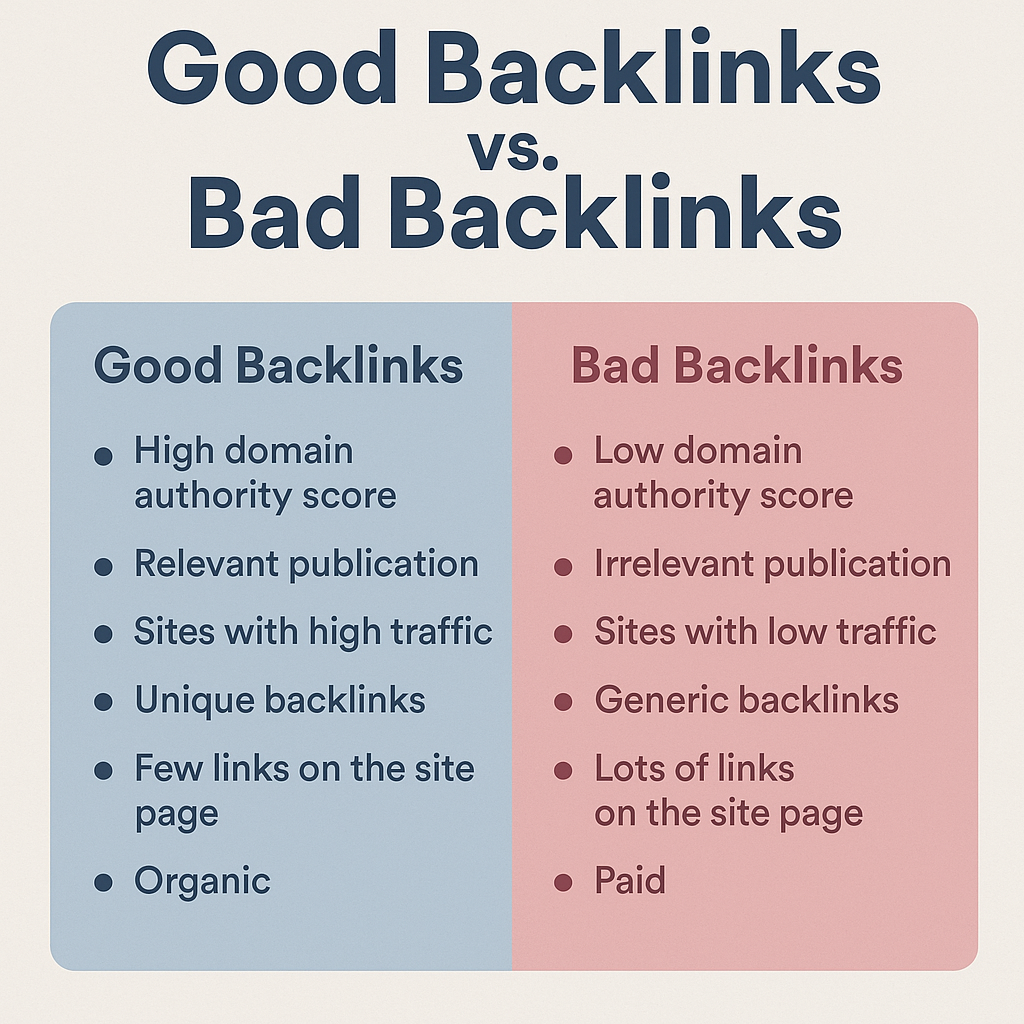
How to Get Quality Backlinks for Your Blog
Now that you know what a good backlink is and why it’s important, how do you draw them to your website?
Here are 10 ways to do it.
1. Publish Ultimate Guides
If you want quality backlinks, you need to create content that deserves to be linked to.
That’s where ultimate guides come in.
Ultimate guides are comprehensive, in-depth resources that cover every aspect of a topic, making them the go-to reference in your niche.
Think about it: when bloggers, journalists, or industry professionals need to reference something, they’re more likely to link to one ultimate source rather than multiple fragmented articles. If your guide is the best, it will attract natural, high-quality backlinks over time.
Let me show you how to create an ultimate guide that earns backlinks.
Step 1: Pick a High-Demand Topic
The best topics for an ultimate guide:
- Has search demand – Use tools like Google Keyword Planner to see if people are searching for information on the topic.
- Is broad enough – The topic should be wide enough to warrant a deep dive.
- Has existing link-worthy content – If other sites have written long-form content on it, that’s a good sign it’s a linkable topic.
👉 Example topics:
“The Ultimate Guide to Digital Photography”
“The Definitive Guide to Local SEO for Small Businesses in 2025”
“The Beginner’s Guide to Email Marketing”
How to find ideas:
Search Google for “[your niche] + ultimate guide” and analyze existing guides.
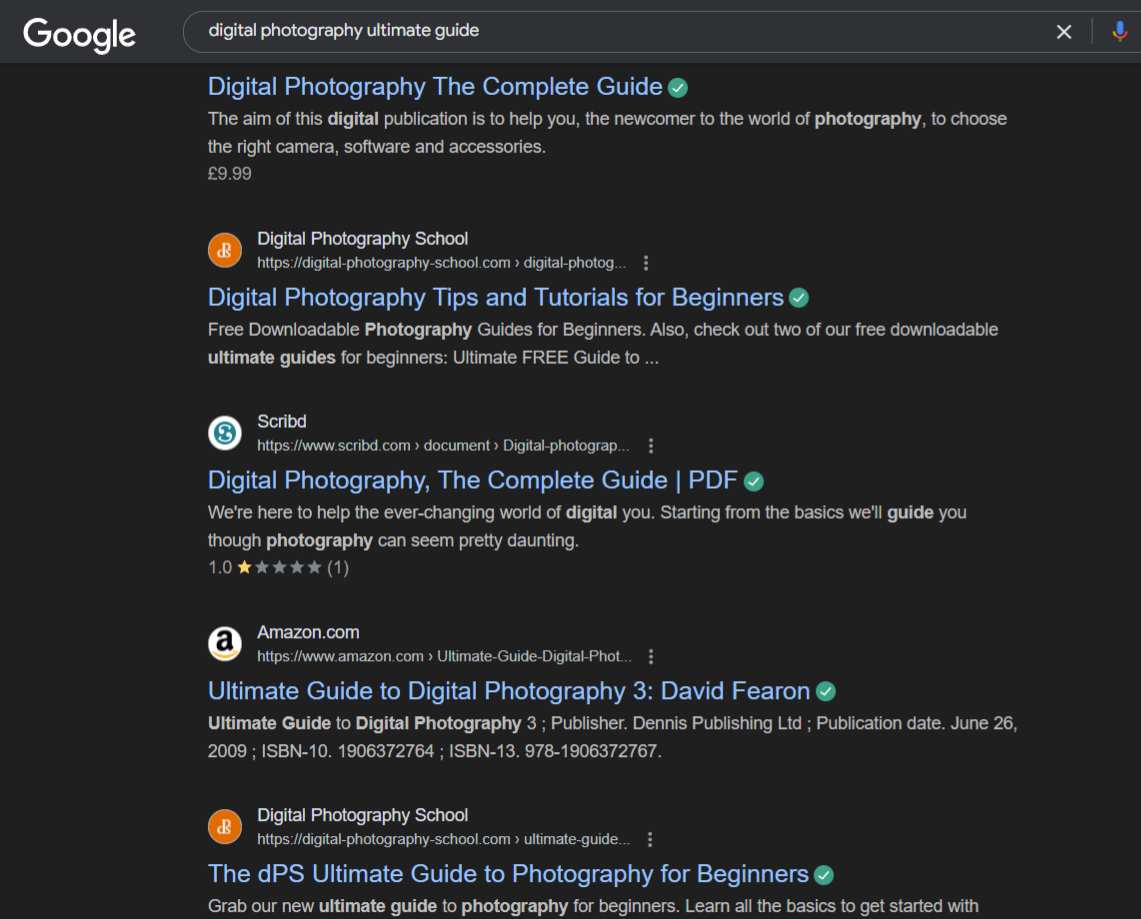
Can you make something better, more detailed, or more up-to-date than these?
Step 2: Make It the Best Resource Available
Once you’ve chosen a topic, you need to go above and beyond what’s already out there. Here’s how:
📝 Cover Everything in Detail
- Think of every possible question a reader might have and answer it.
- Include case studies, examples, statistics, and actionable tips.
💡Pro Tip: You can use ChatGPT to build out your outline or use a long-form content writer like BrandWell to write the initial draft for your ultimate guide. Hundreds of marketers and agencies have been using BrandWell to produce long-form informative content (with up to 12,000 words!) so it’s perfect for creating in-depth guides. Read one of our case studies here.
📊 Use High-Quality Visuals
- Infographics: These make your guide more shareable.
- Custom Graphics & Charts: Helps explain concepts more effectively.
- Screenshots & Step-by-Step Tutorials: Makes the guide more actionable.
🔗 Add Internal & External Links
- Link to other relevant content on your blog to boost SEO.
- Reference high-authority sources (research papers, case studies) to increase credibility.
🚀 Keep It Well-Structured
- Use clear headings, subheadings, and bullet points to improve readability.
- Add a table of contents for easy navigation.
Step 3: Promote Your Guide to Earn Backlinks
Even the best content won’t get backlinks if no one knows about it. Here’s how to promote your guide effectively:
📩 Reach Out to Bloggers & Websites in Your Niche
Find websites that have linked to similar content before and send them an email like this:
“Hey [Name], I saw you linked to [similar resource] in your article on [topic]. I recently published an updated, in-depth guide on this subject that might be a great resource for your audience. Let me know if you’d be interested in checking it out!”
📣 Share on Social Media & Engage with Influencers
- Tag industry influencers and ask for their feedback.
- Share snippets, infographics, or key takeaways to generate engagement.
📰 Submit to Online Communities & Forums
- Post on Reddit, Quora, and niche Facebook groups to drive traffic and backlinks.
- Answer relevant questions and include your guide as a resource.
Creating an ultimate guide isn’t just about writing long content — it’s about writing the most valuable, share-worthy content on the web.
If you do it right, your guide can become an evergreen backlink magnet, driving traffic and authority for years to come. 🚀
2. Authority Resource Pages
One of the easiest ways to get backlinks is by getting featured on Authority Resource Pages — web pages that curate the best links on a specific topic.
These pages exist across every industry, from digital marketing to health, finance, and even niche hobbies. If you can get your content listed on these pages, you’ll earn high-quality backlinks with minimal effort.
So how do you find these authority resource pages?
Step 1: Do a Google Search
On the search field, type these search operators + your keyword:
“best resources”
“helpful links”
“recommended reading”
“useful websites”
“helpful resources”
“further reading”
“additional resources”
👉 Example: If you wrote a photography guide, search for:
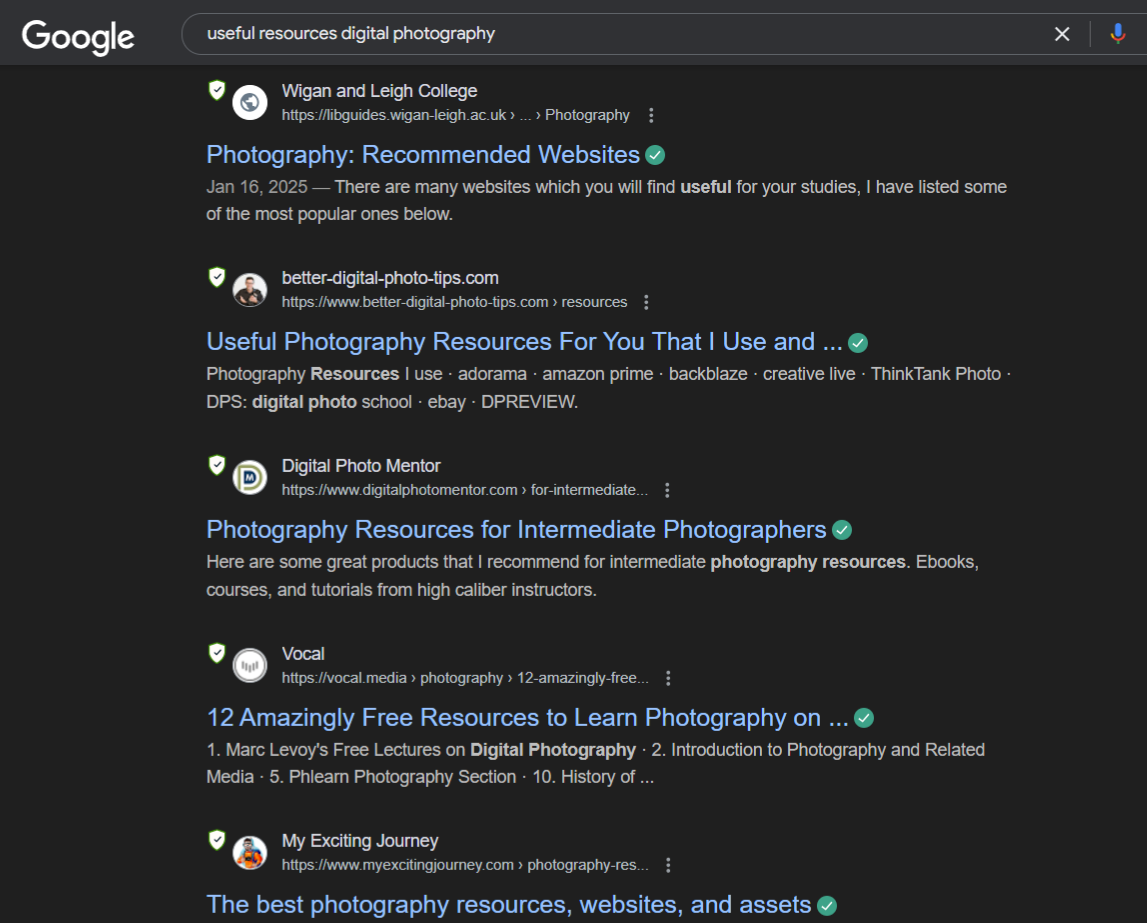
If you have access to Ahrefs or Semrush, you can also search for competitor backlinks to find resource pages already linking to similar content.
Step 2: Contact the Website Owner or Editor
Once you’ve found relevant resource pages, it’s time to reach out and request a link.
Find their contact email or LinkedIn profile (check their “About” or “Contact” page) and ask nicely for a link.
You can use this simple, non-pushy email template:
Subject: A Great Resource for Your [Topic] Page
Hi [First Name],
I came across your [Resource Page Name] and found it super helpful! I wanted to reach out because I recently published a [Short Description of Your Content] that could be a valuable addition.
Here’s the link: [Your URL].
If you think it would be useful for your audience, I’d love for you to consider adding it to your list of resources. Either way, thanks for putting together such a great page!
Best,
[Your Name]
💡Pro Tips:
- Keep it short & personalized — mention their page by name.
- Highlight why your content is valuable — not just “Hey, link to me!”
- Follow up once if you don’t get a reply (wait 5-7 days).
Getting backlinks from authority resource pages is one of the fastest, easiest ways to build high-quality links.
✅ It’s low effort — you’re not creating new content, just pitching existing content.
✅ It’s high reward — one good resource page link can boost your SEO for years.
✅ It’s underused — fewer bloggers do this, meaning more success for you!
3. Publish Original Research
Ever wonder why websites like HubSpot, Moz, and Backlinko get thousands of backlinks? 🤔
It’s because they publish original research — studies, surveys, and data-driven reports that people reference in their own content.
If you want high-authority backlinks, publishing original research is one of the most powerful (yet underutilized) strategies. When you provide unique data, statistics, and insights, other bloggers, journalists, and industry leaders will naturally cite and link to your findings.
Here’s a step-by-step guide on how to publish original material and get backlinks.
Step 1: Decide What Type of Research to Conduct
You don’t need a PhD to create original research! There are several ways to collect unique data:
🔹 Surveys & Polls – Ask people in your industry questions and compile their responses.
🔹 Case Studies – Share real-world results from your own experiments or client work.
🔹 Public Data Analysis – Find and analyze trends from government or industry reports.
🔹 Social Media Data – Collect insights from Twitter, LinkedIn, or Reddit discussions.
👉 Example Research Topics:
“2025 Blogging Trends: Insights from 500+ Professional Bloggers”
“What’s the Average Email Open Rate? We Analyzed 1 Million Emails”
“SEO in 2025: 87% of Marketers Say Backlinks Still Matter”
Step 2: Gather & Analyze Your Data
Now that you have a research topic, it’s time to collect data.
📊 Conduct a Survey
- Use Google Forms, Typeform, or SurveyMonkey to collect responses.
- Ask open-ended & multiple-choice questions to get meaningful insights.
- Target the right audience – Share your survey in Facebook groups, LinkedIn, Reddit, or email lists.
🔍 Analyze Public Data
- Find datasets from sources like Statista, Google Trends, or government reports.
- Identify trends and patterns that haven’t been highlighted before.
📈 Run an Experiment or Case Study
- Test a marketing tactic, SEO strategy, or social media trend.
- Document before-and-after results and turn them into a report.
Step 3: Publish Your Research in a Link-Worthy Format
Once you have your findings, publish them in a way that encourages backlinks.
- Create a Long-Form Blog Post – Break down your research in an easy-to-read format.
- Use Visuals & Infographics – Charts and graphs make your data more shareable.
- Offer a Downloadable PDF – Some people prefer to reference a formatted report.
👉 Example Headline Formats:
“We Surveyed 1,000 SEO Experts: Here’s What We Learned”
“The Ultimate 2025 Blogging Trends Report (Data from 500+ Blogs)”
Step 4: Promote Your Research to Earn Backlinks
How do you get people to notice your work?
📩 Reach Out to Bloggers & Industry Leaders
Find articles that cover similar topics and pitch your research as a valuable resource. Here’s an email template I would suggest:
Subject: New Study on [Your Topic] – Thought You’d Find This Interesting!
Hi [First Name],
I recently published an in-depth research report on [Topic], analyzing [Key Findings]. Given that you’ve written about [Related Topic], I thought you might find this useful.
Here’s the report: [Your Link].
If you think your audience would benefit, feel free to mention it in your content! Let me know what you think.
Best,
[Your Name]
🎤 Submit Your Research to Industry Publications
- Websites like Forbes, Business Insider, and niche blogs love fresh data.
- Pitch your findings as a guest article or expert insight.
📣 Promote on LinkedIn
- Share key takeaways, stats, and infographics on LinkedIn.
- Ask your network to reshare your findings.
📰 Get Featured in Roundups & Resource Pages
- Many bloggers create “Top Marketing Stats for 2025” or “SEO Data You Need to Know” roundups.
- Reach out and suggest including your research in their next article.
Publishing original research is one of the best ways to earn high-quality, natural backlinks from top-tier sites because:
✅ People WANT to link to fresh data – you’re giving them a reason to reference your work.
✅ It positions you as an authority – making you the go-to expert in your niche.
✅ It creates evergreen backlinks – your stats will get cited for years.
4. Guest Post for Popular Websites
Another tried-and-tested strategy for getting high-quality backlinks and exposure is guest posting.
Guest posting (or guest blogging) means writing articles for other websites in your niche in exchange for a backlink to your own site. It’s a win-win — you provide valuable content, and in return, you get a powerful backlink, brand exposure, and referral traffic.
But here’s the thing: not all guest posts are created equal. Writing for low-quality blogs won’t help much. Instead, you need to target authoritative sites that actually move the needle for SEO.
These are sites that:
✅ Have high domain authority (DA 40+)
✅ Get consistent traffic (check with SimilarWeb or Ahrefs)
✅ Are relevant to your niche (tech, marketing, health, etc.)
✅ Allow dofollow backlinks (some only give nofollow links, which don’t help SEO)
How do I find these high-quality sites?
Step 1: Do a Google Search
Use search operators like:
“write for us” + [your niche]
“guest post guidelines” + [your niche]
“become a contributor” + [your topic]
“submit an article” + [your niche]
👉 Example: If you blog about digital marketing, search for:
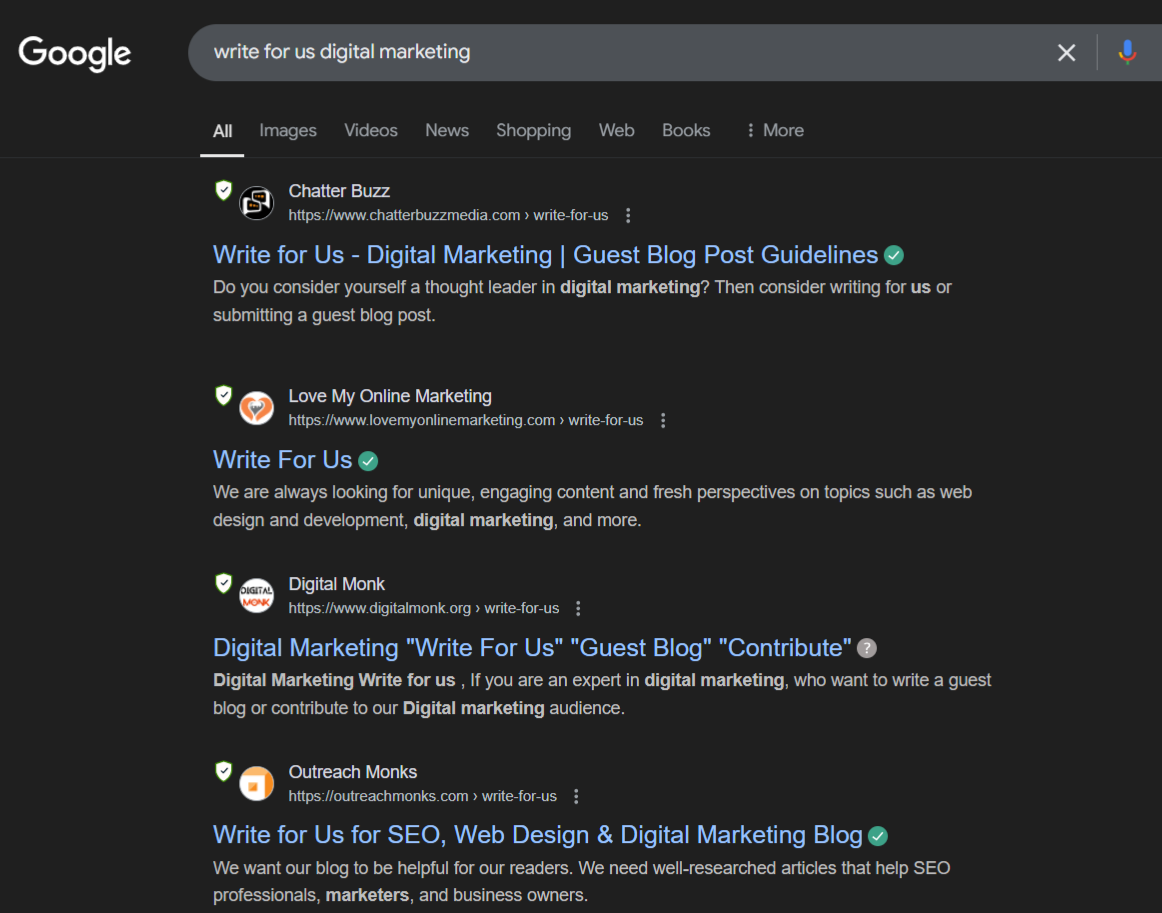
Step 2: Research the Site & Read Their Guidelines
Before pitching, read their existing content and guest post guidelines (if available).
Key things to check:
- What topics do they cover?
- What’s their writing style? (Casual, formal, data-driven?)
- Do they allow links in the content, or only in the author bio?
Step 3: Craft a Killer Outreach Email
Once you’ve found a great site, email the editor with a personalized pitch.
Here’s an example:
Subject: Guest Post Idea for [Site Name]
Hi [Editor’s Name],
I’m [Your Name], a [your niche] blogger at [Your Blog Name]. I’ve been following your site for a while, and I love your content — especially your recent post on [mention a specific article].
I’d love to contribute a guest post to [Site Name]. Here are a few topic ideas I think your readers would find valuable:
1️⃣ [Proposed Topic #1] – [Brief explanation]
2️⃣ [Proposed Topic #2] – [Brief explanation]
3️⃣ [Proposed Topic #3] – [Brief explanation]Let me know if any of these sound like a good fit! I’d be happy to send over a draft. Looking forward to your thoughts.
Best,
[Your Name]
[Your Website]
Step 4: Write an Outstanding Guest Post
Once your pitch is accepted, write a high-quality post that exceeds expectations.
- Follow the site’s writing style (match their tone & format).
- Add original insights (don’t just rehash common tips).
- Include data, case studies, and examples to add credibility.
- Link naturally to your blog — don’t force it!
- End with a strong CTA (call-to-action).
💡Pro Tip: Again, you can use BrandWell to write as many guest posts as you want. Just enter a keyword or topic and the AI will generate a long-form article based on what’s currently ranking on Google. Of course, you’ll have to add your personal insights to improve the AI draft.
Here’s an example of a guest post that I “wrote” using BrandWell:

Step 5: Maximize Your Backlink Value
Guest posting isn’t just about getting a single backlink — you can strategically place multiple backlinks for maximum SEO impact.
Best places to include your links:
- In the body of the article (as a contextual link) – More valuable than an author bio link.
- In your author bio – This is where most sites allow a link back to your blog.
Step 6: Scale Guest Posting for More Backlinks
Once you’ve had success with a few guest posts, you can scale up your efforts:
- Create a guest post tracking sheet – Track which sites you’ve pitched, responses, and published posts.
- Repurpose your content – Adapt your guest posts into LinkedIn posts, Twitter threads, or YouTube videos.
- Leverage guest posts for bigger opportunities – If you get featured on a well-known site, use it to pitch even bigger sites.
Guest posting isn’t just about backlinks — it’s about building authority, growing your audience, and driving real traffic.
If you guest post on 1-2 high-quality blogs per month, your backlink profile and website authority will skyrocket over time.
5. Publish Skyscraper Content
If you want to outrank your competitors and attract tons of backlinks, you need to publish Skyscraper content — a proven strategy for getting high-quality backlinks on autopilot.
This technique, coined by Brian Dean of Backlinko, involves finding top-performing content in your niche, improving it significantly, and then promoting it to the right audience.
Why does it work? Because people naturally want to link to the best, most up-to-date, and most valuable content.
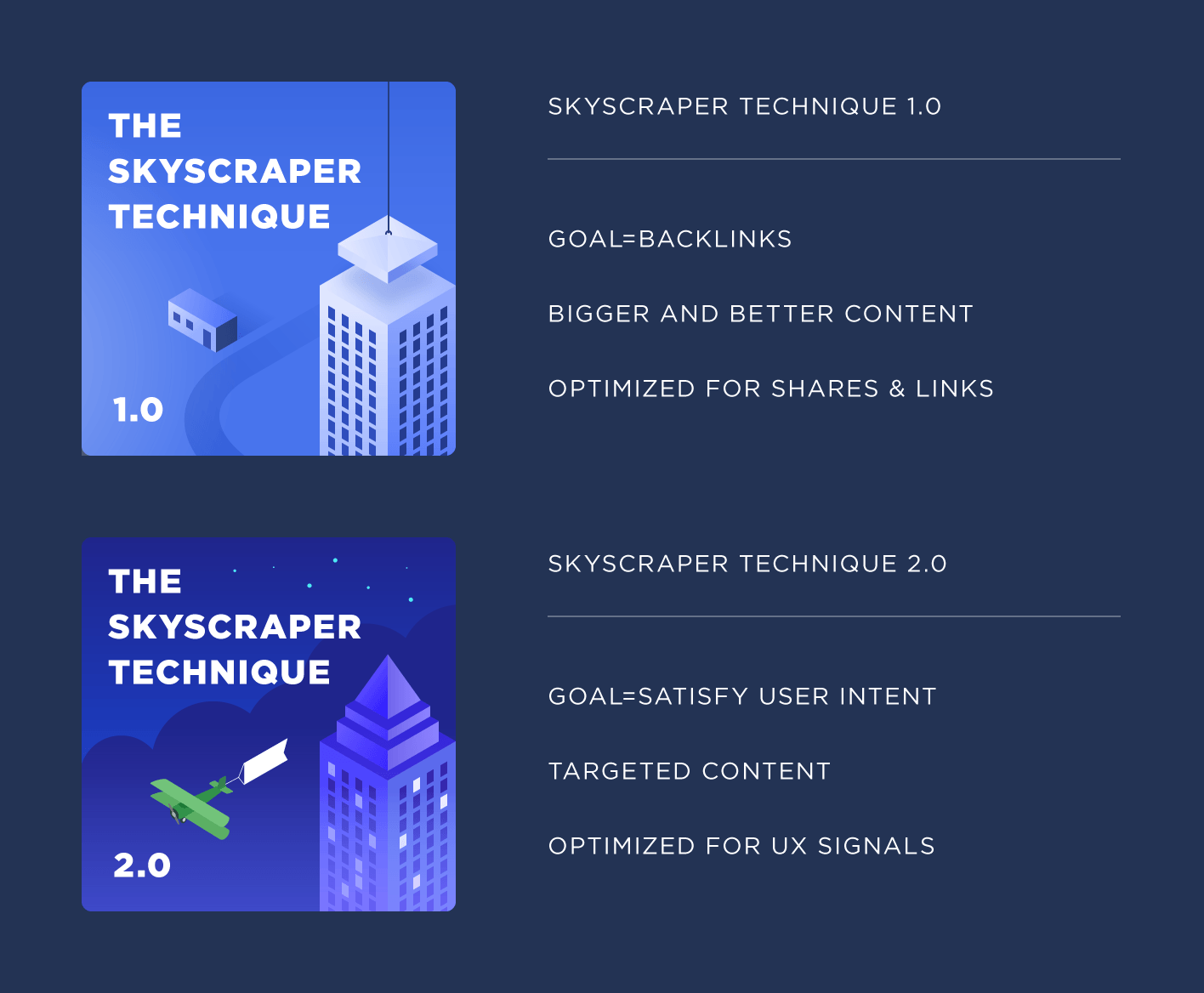
Image source: Backlinko
Let’s break down how to execute the Skyscraper Technique step by step.
Step 1: Find High-Performing Content With Lots of Backlinks
Your first step is to find existing content that’s already ranking well on Google and attracting tons of backlinks.
Go to Google and search for your keyword with terms like:
“best [topic]”
“ultimate guide to [topic]”
“top 10 [topic]”
Then, analyze the top-ranking pages and look for content that:
✅ Has outdated information
✅ Is missing key insights
✅ Could benefit from better visuals, data, or examples
Step 2: Create a More Comprehensive & Valuable Version
Now, take that existing content and make it 10X better.
- Expand on the topic – Add more in-depth explanations, case studies, and new insights.
- Update outdated information – Remove old stats and replace them with fresh data.
- Add visuals & infographics – People love engaging, easy-to-understand content.
- Improve readability – Use short paragraphs, bullet points, and clear headings.
- Optimize for SEO – Add relevant keywords, internal links, and structured formatting.
👉 Example:
Replace “10 SEO Tips for 2024” (generic and outdated) with:
“The Ultimate SEO Strategy Guide for 2025” (backed by data & case studies)
“27 Proven SEO Techniques for 2025” (updated & actionable)
Step 3: Promote Your Content to Earn Backlinks
Like in our previous strategies, you need to promote your Skyscraper content to get backlinks.
📩 Reach Out to Sites That Linked to Similar Content
Use Ahrefs or Moz to find sites that link to the original post and reach out with your improved version.
Like this:
Subject: I Noticed You Linked to [Old Article] – Here’s an Updated Version!
Hi [First Name],
I came across your article on [their website], and I noticed you linked to [old resource].
I recently created an updated and even more comprehensive guide on [your topic], with new data and fresh insights. You can check it out here: [your link].
I thought it might be a valuable addition to your article! Let me know what you think.
Best,
[Your Name]
📢 Share on Social Media & Communities
Promote your content on:
- LinkedIn & Twitter – Share insights and tag influencers.
- Reddit & Niche Forums – Engage in relevant discussions.
- Facebook Groups & Slack Communities – Find niche-specific groups.
Additional Reading: 22 Places You Should Be Sharing Your Content
📰 Get Featured in Roundups & Listicles
Many bloggers publish weekly or monthly roundups featuring the best industry content.
Search for roundup opportunities:
“best [your topic] posts of the week”
“[your niche] link roundup”
“best resources for [your topic]”
Reach out and suggest including your article in their next roundup.
🎤 Leverage Influencer Outreach
- Identify key influencers in your industry.
- Send them a personalized message showcasing your content.
- Ask them to share or link to it if they find it valuable.
6. Submit Articles for Publication
Submitting articles for publication on respected media sites like Forbes, Entrepreneur, Inc., and industry-specific journals is a powerful way to gain authoritative backlinks.
Many high-traffic publications allow guest contributions, and they often provide a valuable dofollow backlink either in the author bio or within the article itself.
Follow these steps to get published on these platforms:
Step 1: Identify High-Authority Websites That Accept Contributors
Not all publications allow guest contributors, so you need to find the right ones.
Do a Google search and use the same operators that we used for guest posting:
“write for us” + [your niche]
“submit an article” + [your industry]
“contributor guidelines” + [your topic]
Some of the best sites to get published include:
- General Business & Marketing: Forbes, Entrepreneur, Inc., Fast Company
- Tech & Startup Blogs: TechCrunch, Wired, VentureBeat
- Health & Wellness: Healthline, MindBodyGreen, Verywell Fit
- Finance & Investing: Investopedia, The Motley Fool, NerdWallet
💡 Pro Tip: Also check industry-specific trade magazines, niche blogs, and association websites for guest contribution opportunities.
Step 2: Research Submission Guidelines
Each publication has its own guidelines so read them carefully before pitching.
Things to check:
✅ Do they allow guest contributions?
✅ Do they provide a dofollow backlink?
✅ What types of content do they prefer (listicles, opinion pieces, case studies)?
✅ Do they require exclusive content (or can you republish on your blog)?
Step 3: Pitch a High-Quality Article Idea
Editors receive tons of submissions so your pitch needs to stand out.
- Focus on unique, valuable insights.
- Use data, expert quotes, or case studies to make your article stronger.
- Write for their audience, not just to promote yourself.
Winning article ideas for publications:
“The Future of [Your Industry] in 2025 – Expert Predictions”
“How I [Achieved X] and What I Learned” (Case Study)
“The Science Behind [Topic] – What Research Says”
Step 4: Pitch the Right Editor or Submission Page
If the publication has a contributor application page, follow the instructions there.
Otherwise, you may need to email the right editor directly.
Like this:
Subject: Article Idea for [Publication Name]
Hi [Editor’s Name],
I’m [Your Name], a [your industry] writer at [Your Blog Name]. I love [Publication Name] and found your recent article on [mention a relevant article] insightful.
I’d love to contribute a piece titled “[Your Article Idea]”, which explores [brief explanation]. I believe it would be valuable for your audience because [explain why it’s unique].
Here’s a quick outline:
- [Main Point #1]
- [Main Point #2]
- [Main Point #3]
Let me know if this sounds like a good fit! I’d be happy to send a full draft.
Best,
[Your Name]
[Your Website]
Step 5: Write & Submit Your Article
If the editor accepts your pitch, write a well-researched, engaging article.
Checklist for a winning article:
✅ Follow the site’s style & tone.
✅ Use compelling data & expert insights.
✅ Include internal links to their content (they’ll appreciate it).
✅ Add a natural backlink to your blog (within the content or in the author bio).
✅ Include a strong call-to-action (CTA).
Once approved, your article goes live, and you get a powerful backlink from a top-tier publication!
Bonus: How to Get Published on Forbes, Inc., & Entrepreneur
If you want to contribute to Forbes, Inc., or Entrepreneur, you typically need to:
🔹 Have strong credentials (a blog, book, or expertise in your field).
🔹 Submit a detailed application on their contributor page.
🔹 Provide writing samples or previously published articles.
🔹 Build relationships with existing contributors or editors (networking helps!).
📌 Alternative Route: Some people hire PR agencies or journalists to help them get featured in these major publications.
7. Become a Source for Reporters and Bloggers
If you want high-authority backlinks from major publications like The New York Times, you need to become a trusted source for journalists and bloggers.
How do you do that? By using platforms like Qwoted and SourceBottle where reporters actively look for expert insights.
By providing valuable quotes, statistics, or expertise, you can land free, high-quality backlinks from well-known sites.
Unlike guest posting, you only need to submit short, expert answers. If a journalist picks your response, they quote you and link to your blog.
How to become the source for journalists and bloggers:
Step 1: Sign Up for Qwoted, SourceBottle, ProfNet & Other Platforms
Create a professional profile with your name, expertise, and website link. This makes it easier for journalists to verify your credibility.
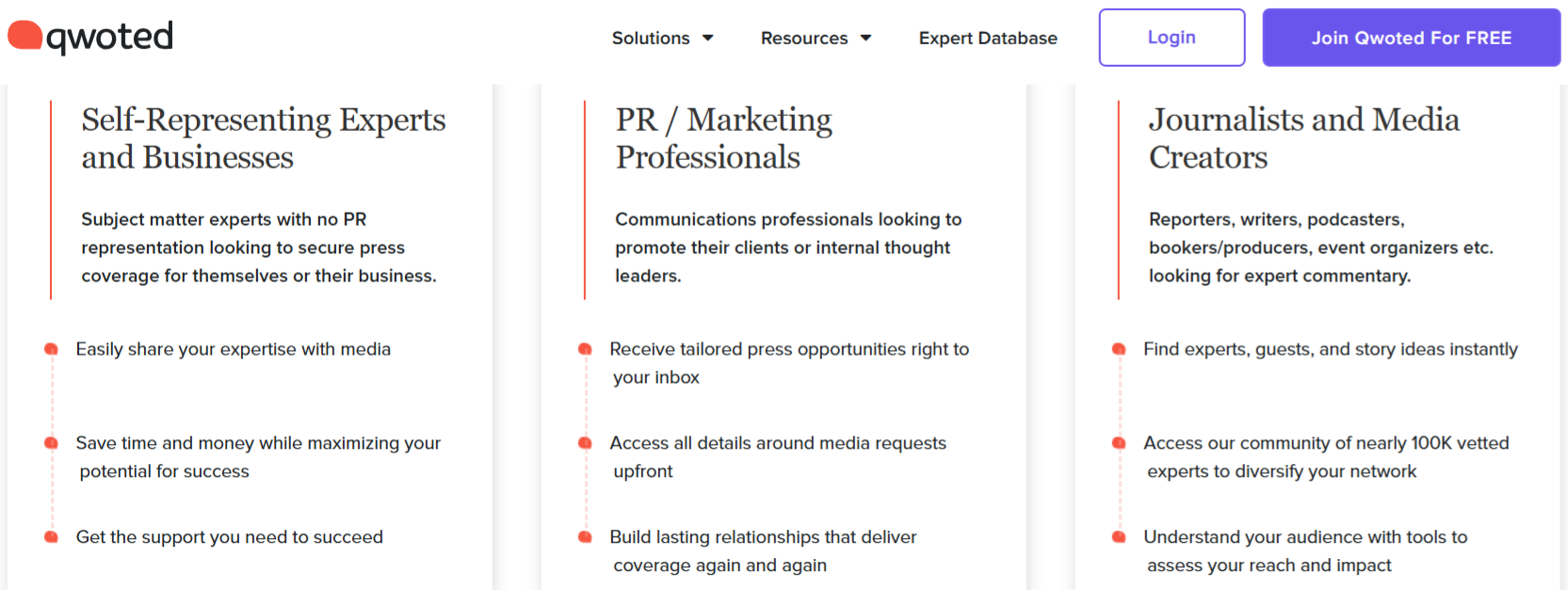
Step 2: Monitor Journalist Queries Daily
These platforms usually send 3 email digests per day (morning, afternoon, and evening). Each digest contains journalist requests across various industries.
Look for requests related to your niche and respond ASAP — journalists often receive hundreds of pitches, so speed matters.
👉 Example Query:
Seeking SEO Experts: How Will Google’s Algorithm Change in 2025?
Publication: Forbes
Deadline: Tomorrow at 2 PM EST
Requirements: SEO professionals or digital marketers
This is a golden opportunity! If your response gets selected, you get a backlink from Forbes.
Step 3: Craft a Compelling, Expert Response
Your response must be concise, insightful, and actionable.
Here’s a response template:
Subject: Qwoted Response: Google Algorithm Trends for 2025
Hi [Journalist’s Name],
My name is [Your Name], and I’m an [SEO Expert/Founder at XYZ Blog]. I’ve been in digital marketing for [X] years, helping brands improve rankings through algorithm-proof strategies.
Here’s my expert insight on how Google’s algorithm may change in 2025:
✅ AI-Driven Search: Google’s AI advancements (like SGE) will prioritize search intent over keywords.
✅ EEAT (Experience, Expertise, Authoritativeness, Trustworthiness) will carry more weight — blogs must establish credibility.
✅ Backlinks Will Matter Less – Instead, engagement signals and content quality will drive rankings.Let me know if you’d like more details! You can check out my latest insights at [your blog link].
Best,
[Your Name]
[Your Website]
💡 Pro Tips:
- Lead with your credentials to establish credibility.
- Answer directly & offer unique insights — journalists don’t want generic responses.
- Keep it under 150 words (shorter is better).
- End with a website link (this is where your backlink comes from).
Step 4: Follow Up & Build Relationships
If you don’t hear back in a few days, don’t be discouraged — journalists receive tons of pitches.
To improve your chances:
- Engage with journalists on Twitter & LinkedIn.
- Send follow-up pitches if you see their name again in HARO.
- Once published, thank them and share the article on social media.
8. Build Links From Outdated Resources
One of the most overlooked but highly effective link-building strategies is finding and replacing outdated links on high-authority websites with links to your own fresh, relevant content.
Outdated resource link building is one of the easiest ways to earn white-hat backlinks from reputable sites.
Let’s explore how you can use outdated resources to score quality backlinks.
Step 1: Find Outdated Links in Other Websites Your Niche
There are two main ways to find outdated links:
1️⃣ Use Google Search Operators
Use Google search queries to find pages with old resources in your niche.
“SEO guide 2020” (replace with any old year)
“Best blogging tools 2018″
“Top digital marketing trends 2019”
These searches will lead you to articles with outdated resources that may need updating.
2️⃣ Use Ahrefs or Check My Links
For a faster, more automated approach, use SEO tools to find outdated links.
- Ahrefs Site Explorer – Enter a competitor’s website, check their outgoing links, and filter by “Broken Links.”
- Check My Links (Chrome Extension) – Scans web pages and highlights broken links in red.
Look for high-authority websites (DA 60+) with outdated links as they offer more SEO value when replaced.
Step 2: Create a Better, Updated Version of the Content
Once you’ve found an outdated or broken link, check what content it originally pointed to.
🔹 If the content is missing or outdated, create a fresh, in-depth version on your blog.
🔹 If you already have a similar article, update it with new information and data.
👉 Example:
You find a broken link to a “2020 SEO Guide”.
You write a brand-new “2025 SEO Guide” with the latest strategies.
Now, you have a perfect replacement to suggest to the site owner.
Step 3: Reach Out to the Website Owner
Now, it’s time to politely inform the website owner about the outdated or broken link and suggest your replacement.
Try this:
Subject: Quick Fix for a Broken/Outdated Link on Your Site
Hi [Website Owner’s Name],
I was reading your article “[Article Title]” and noticed that one of the links to [Old Resource] is either broken or outdated.
I recently published an updated, more comprehensive guide on [Topic] that might be a great replacement: [Your Link].
I think your readers would find it valuable, and it would help improve the experience on your site.
Let me know what you think! 😊
Best,
[Your Name]
[Your Blog Name]
Step 4: Get Your Link Accepted & Track Your Results
Once the site owner agrees to replace the outdated link, they will update their content and link to your blog instead! 🚀
Building links from outdated resources is a win-win strategy:
✅ Website owners fix broken links → You help them improve their content.
✅ You gain high-authority backlinks → Your blog’s SEO improves.
9. Use Content Formats Proven To Generate Links
Some types of content naturally attract backlinks more than others. If you want to maximize your link-building efforts, focus on content formats that people love to reference, share, and link to.
Here are the top 5 content formats that get the most backlinks:
1. Data-Driven Research & Original Studies
One of the best ways to earn high-quality backlinks is by publishing original data, statistics, or industry studies.
👉 Examples:
“The State of SEO in 2025: 50+ Statistics & Trends”
“Survey: How Bloggers Are Making Money in 2025”
“Case Study: How We Increased Traffic by 300% in 6 Months”
Backlinko’s SEO study analyzing 11.8 million Google search results has been linked thousands of times by major websites like HubSpot and Search Engine Journal.

2. Ultimate Guides & Long-Form Content
Comprehensive ultimate guides attract backlinks because they cover everything in one place — making them the go-to resource for a topic.
👉 Examples:
“The Ultimate Guide to Email Marketing in 2025”
“How to Start a Blog: A Step-by-Step Guide (2025 Edition)”
“The Complete Beginner’s Guide to SEO”
Brian Dean’s Definitive Guide to On-Page SEO has been linked thousands of times because it’s an all-in-one resource for beginners and experts.
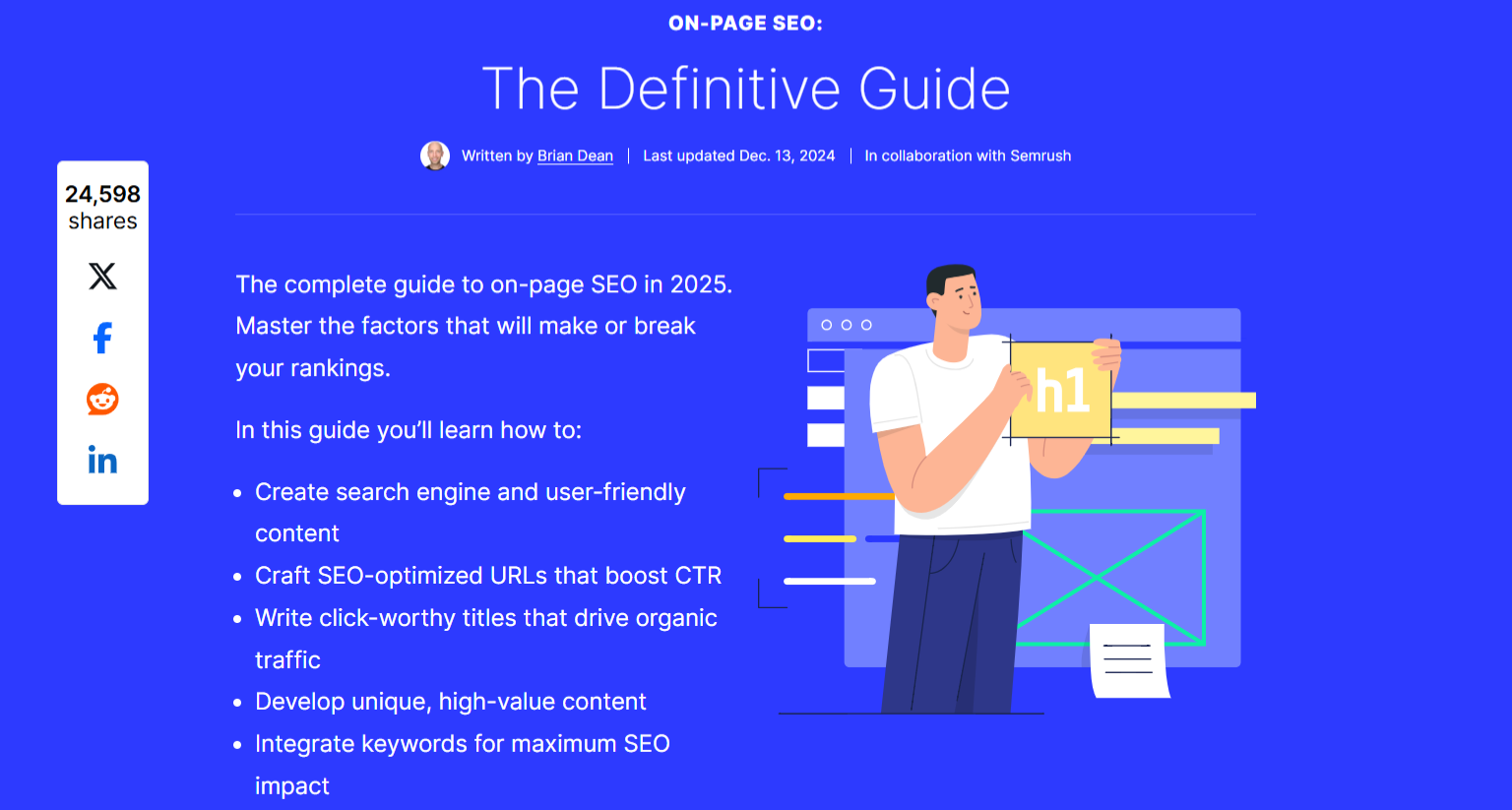
3. Infographics & Visual Content
Infographics are one of the most shareable content types, making them a great way to earn passive backlinks.
It simplifies complex information, making it easier to digest. Plus, people love sharing visuals on blogs, social media, and Pinterest.
👉 Examples:
“The Evolution of SEO (1998-2025)”
“How the Google Algorithm Works (Explained in One Graphic)”
“The Psychology of Colors in Marketing”
Neil Patel’s blog uses infographics in almost every post, earning thousands of backlinks from websites that embed them.
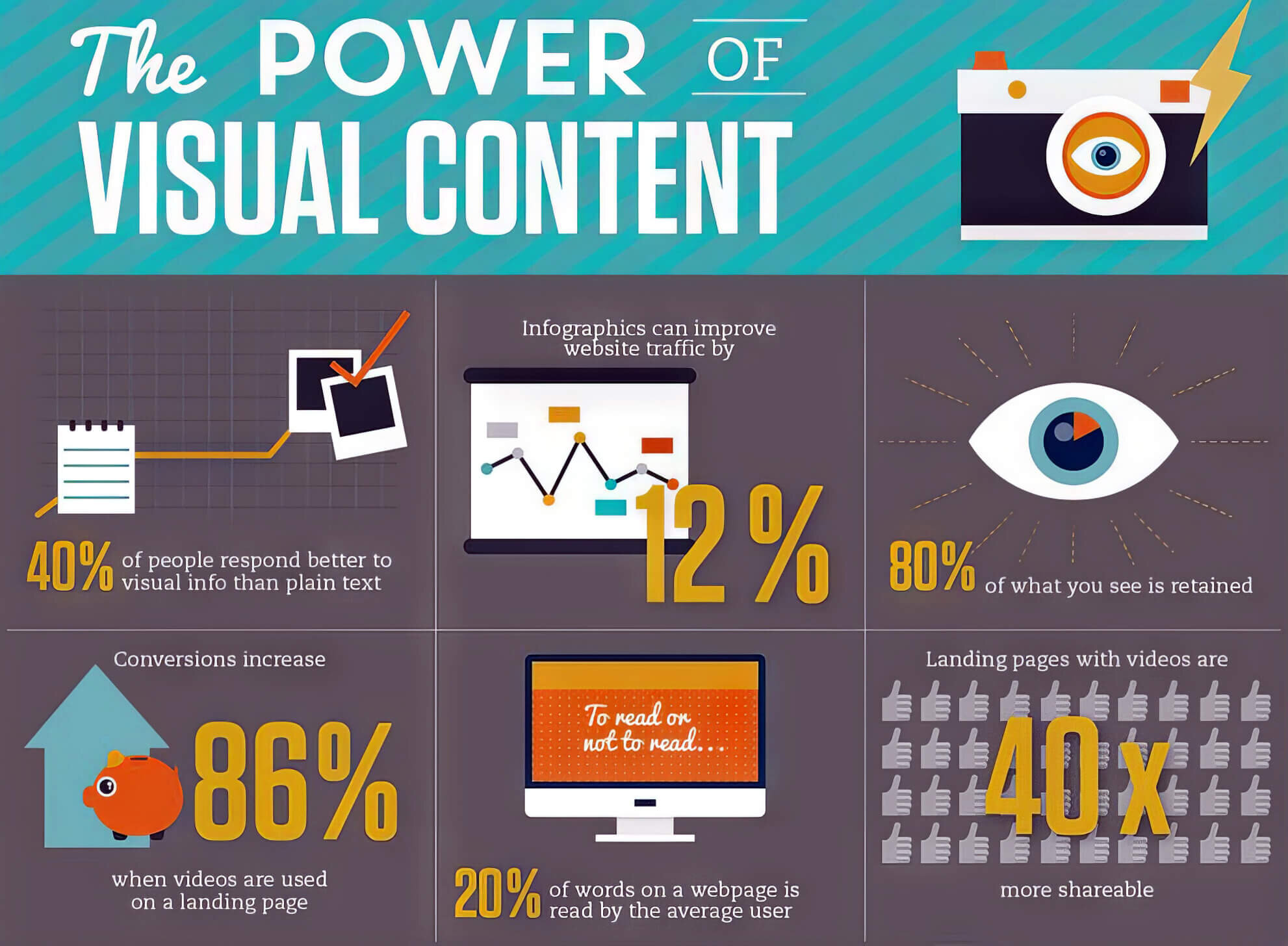
Image source: Demand Gen Report
4. Free Tools, Templates & Calculators
Free tools attract consistent backlinks because they provide value to users without asking for anything in return.
Free tools rank well on Google and get shared widely. They also provide long-term backlink opportunities since they stay useful over time.
👉 Examples:
“Free SEO Title Generator”
“Blog Post Headline Analyzer”
“Marketing Budget Calculator”
CoSchedule’s Headline Analyzer tool has been linked thousands of times because bloggers recommend it in their content marketing guides.

5. Expert Roundups & Interviews
Featuring expert insights in your blog posts helps you attract backlinks from industry leaders.
These posts rank well because they include multiple expert contributions. They also drive high engagement and social shares.
👉 Examples:
“25 SEO Experts Share Their Top Ranking Tips for 2025”
“15 Content Marketing Experts Reveal Their Best Strategy”
“The Future of AI in Blogging: 10 Experts Weigh In”
10. Use Branded Strategies and Techniques
One of the most powerful ways to earn backlinks organically and consistently is by creating a unique, branded strategy or technique that people reference in their content.
Think about some well-known SEO terms like “The Skyscraper Technique” (Brian Dean) or “10x Content” (Rand Fishkin) — these concepts were invented by experts, and now thousands of people reference (and link to) them.
You can do the same in your niche!
Here’s how:
Step 1: Identify a Problem in Your Niche
Start by finding a common problem that people struggle with in your industry.
👉 Examples:
In SEO: “How do I create content that gets backlinks?”
In Fitness: “What’s the best way to lose belly fat fast?”
In Marketing: “How do I write emails that convert?”
Use these methods to uncover problems:
- Reddit & Quora – Look for repeated questions in your niche.
- SEO Tools – Use Ubersuggest to find keywords with “how to” in them.
- Social Media Polls – Ask your audience what their biggest challenges are.
Step 2: Develop a Unique Solution
Now, come up with a unique process, technique, or framework that solves the problem better than existing methods.
👉 Examples:
“The Skyscraper Technique” – A new way to create content that earns backlinks.
“The Pomodoro Technique” – A time management method using 25-minute focused work sessions.
“The KLT (Know-Like-Trust) Formula” – A simple sales psychology framework for marketing.
Your branded technique should:
✔ Be easy to explain – Use a simple, memorable name.
✔ Offer a better solution – Make it more efficient or effective than current methods.
✔ Be unique – Even if it’s based on existing ideas, put your spin on it.
Step 3: Name Your Strategy & Make It Catchy
Your branded technique needs a memorable name — something easy to remember, type, and search for.
Try these three naming formulas:
[Adjective] + [Noun] + Method → “The Magnetic Content Method”
[Metaphor] + [Technique] → “The Snowball SEO Strategy”
[Action] + [Framework] → “The Reverse Funnel Formula”
💡 Pro Tip: Before finalizing your name, Google it to make sure it doesn’t already exist.
Step 4: Publish a Detailed Guide on Your Blog
Once you have a unique, catchy name, create a detailed blog post explaining how your technique works.
What to include in your guide:
✔ What the technique is & why it works
✔ A step-by-step breakdown of how to do it
✔ Real-life examples & case studies (if possible)
✔ Diagrams, infographics, or visuals to explain the concept
👉 Example Blog Post Title:
“The Momentum Blogging Method: How to Write More Content in Less Time”
If you can show that your method works, more people will try it, share it, and link to it!
Step 5: Promote Your Branded Strategy & Get Backlinks
Now, it’s time to get the word out so people start referencing (and linking to) your strategy.
- Guest Posting – Mention your strategy in guest blogs.
- Podcasts & Interviews – Share your method when you’re invited as a guest.
- Social Media – Post about it on LinkedIn and create Twitter threads.
- YouTube Videos – Make a tutorial explaining your technique.
- Reddit & Quora Answers – Share your method in relevant discussions.
Lesson: If you create a valuable, unique strategy, people WILL talk about it — and link to it. Branded strategies position you as an authority and help you earn natural backlinks for years to come.
Ultimately, the success of your blogging efforts in terms of visibility and traffic will depend on how much effort you are willing to put into obtaining quality backlinks.
Common Mistakes When You Build Backlinks
The importance of backlinks for your blog is monumental, but if done incorrectly, it can have the opposite effect: It can get you penalized by search engines. To ensure that your backlinking efforts are successful, it is important to avoid these common pitfalls and bad practices.
1. Using Unnatural Anchor Texts
Search engine algorithms have become increasingly sophisticated over the years so using unnatural anchor texts (i.e., keyword stuffing) can easily trigger search engine filters – leading to penalties or, worse, getting removed from its indexed database altogether.
What you should do is focus on creating natural anchor text variations such as brand names or generic phrases which are less likely to suffer negative consequences from search engines.
2. Using Irrelevant or Spammy Sites for Backlinks
Getting backlinks from sites that are unrelated to your niche or that have spammy content can have a negative impact. It’s important to focus on relevance and authority when acquiring backlinks.
Always vet the sites where your backlinks are coming from. Are they relevant to your industry? Are they of good reputation? Tools like Moz’s Spam Score or Ahrefs can help you evaluate the quality and relevance of a website before seeking a backlink.
3. Ignoring Link Diversity
Relying on one type of backlink (e.g., only guest posts or directory submissions) can make your link profile look unnatural.
Diversify your backlink sources by obtaining links from a variety of platforms like blogs, social media, niche directories, forums, and influencers. This creates a more natural and balanced link profile.
Focus on building links from both high-traffic sites and smaller, niche-specific platforms.
4. Not Checking Link Profiles
You should always analyze the link profile of the sites you’re getting backlinks from. If the site has a lot of toxic or low-quality links, getting a backlink from it can harm your site rather than help it.
Use backlink analysis tools to monitor the health of the sites linking to you, and disavow toxic links when necessary.
5. Linking to Low-Authority Websites
Getting links from sites with low domain authority (DA) or trustworthiness can dilute your site’s authority. It’s best to focus on authoritative, reputable websites in your niche.
Look for sites with organic content that aligns with your target audience and industry. Quality over quantity is essential to ensure your backlinks boost your blog authority.
6. Ignoring User Experience Signals
Links that come from websites with poor user experience (slow loading, hard navigation, etc.) can negatively impact your SEO.
Pay attention to the overall user experience of the websites you want backlinks from. A well-designed, fast-loading, and easy-to-navigate site not only provides value to users but also enhances your link’s SEO potential.
Always check site speed with tools like GTmetrix or Google PageSpeed Insights before acquiring a link.
7. Building Backlinks Too Quickly
Rapid, unnatural backlink building can trigger algorithmic penalties, as it might be perceived as an attempt to manipulate search rankings.
Pace your link-building efforts over time. A natural link-building strategy involves slow, consistent growth.
Avoid sudden spikes in backlinks, which can raise red flags with search engines. Aim for a steady stream of high-quality links over a longer period.
8. Focusing Only on SEO Metrics
While SEO metrics like DA and PA are important, they don’t tell the full story.
Son’t ignore the relevance of the website’s content to your niche and audience. Focus on acquiring backlinks from sites that have a genuine relationship with your industry and content, not just those with high metrics.
Make sure you’re also considering factors like how well the linking site resonates with your target audience.
9. Ignoring Local SEO Opportunities
If you’re targeting a local audience, neglecting local backlink opportunities (e.g., local business listings, local influencers, local blogs) can be a missed opportunity. These can give you a significant SEO boost.
Seek out backlinks from local websites like chambers of commerce. Get listed in local directories or sponsor local events to generate local backlinks.
10. Ignoring NoFollow Links
Just because no-follow links aren’t counted by search engine algorithms doesn’t mean they’re not worth pursuing. In fact, these types of links often lead directly to more relevant websites which can benefit both parties.
Plus, since no-follow links don’t carry any weight in SEO, there’s really nothing stopping you from taking advantage of them – so why not?
Remember, search engines take natural editorial links into account when indexing pages for their results pages. Automated link-building tactics such as buying links from link farms or using comment spam are ineffective and may even be punished by search engine algorithms.
To maximize SEO rankings, it is best to focus on organic methods like guest blogging or content marketing campaigns that will earn you natural placements within target publications’ websites/blogs without raising any red flags with search engine bots.
Don’t forget about internal linking. Not only does this help spread PageRank around but it also helps visitors navigate your blog easily for a better user experience. Make sure each post includes at least two internal links – either direct readers towards other posts written by yourself or ones found elsewhere.
Keep in mind that building high-quality backlinks takes time – there is no quick fix here. You need patience and dedication if you want lasting success with link-building activities. Only then will you see real returns on your investments.
Are Backlinks Still Important in 2025?
Despite evolving algorithms and changing digital landscapes, backlinks remain a cornerstone for enhancing your website’s visibility and authority.
Google’s original PageRank algorithm was built around the concept of backlinking. This foundational principle has not wavered over time; in fact, it has been reinforced by numerous studies within the SEO community demonstrating how critical backlinks are to organic search performance.
An analysis across various Google Search Engine Results Pages (SERPs) reveals a consistent trend: websites with higher authority — garnered through substantial links from reputable sources — dominate top positions. This observation is backed by comprehensive research from industry leaders:
- Backlinko’s study underscores that a site’s link authority significantly correlates with superior SERP rankings.
- Semrush’s Ranking Factors Version 2.0 echoes this sentiment, indicating domains with more backlinks enjoy loftier spots on SERPs.
- The findings from Rankings.io further cement this viewpoint in their analysis of personal injury law firms — highlighting domain traffic as heavily influenced by the overall number of referring domains.
This wealth of data makes one thing abundantly clear: striving hard to acquire more links should be an integral part of your strategy to enhance your website’s stature in search engines’ eyes.
While metrics like domain rating may not directly influence search engine algorithms, they serve as valuable indicators for gauging site strength.
The Importance of Backlinks for Your Blog: Vital!
Backlinks help to improve your search engine rankings, increase traffic and build credibility with potential customers.
With careful research and strategic planning, you can create quality backlinks that will benefit your blog in many ways while avoiding common mistakes along the way.

